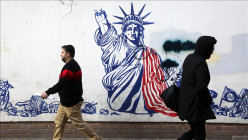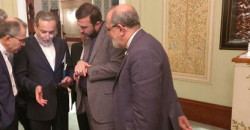Iran, US resume indirect nuclear talks in Rome under Omani mediation

Shafaq News/ Iran and the United States resumed indirect talks on Saturday in Rome over Tehran’s nuclear program, amid mounting US pressure, international consultations involving Russia, and a recent visit by the head of the International Atomic Energy Agency (IAEA) to Tehran.
Iranian Foreign Minister Abbas Araghchi is heading the Iranian delegation, which arrived in Rome earlier today, while US President Donald Trump’s special envoy to the Middle East, Steve Witkoff, is leading the American team. The talks are hosted at the Omani embassy and mediated by Oman’s Foreign Minister Badr Al-Busaidi.
Despite speculation over a possible face-to-face meeting, the negotiations remain indirect.
Ali Shamkhani, senior political advisor to Iran’s Supreme Leader, said the delegation is negotiating with “full authority” and pursuing a “balanced agreement,” not “surrender.”
Iranian Foreign Ministry spokesperson Esmail Baghaei told reporters that “lasting peace is born from honest dialogue between nations, not through the imposition of force,” reaffirming Tehran’s commitment to diplomacy as a “civilized” approach to resolving disputes.
Tehran is demanding guarantees that its centrifuges and uranium stockpiles will remain intact and that its ballistic missile program be excluded from the talks. Washington, meanwhile, insists that Iran halt high-level uranium enrichment as a condition for lifting sanctions.
An Iranian official told Reuters that the country “will not accept dismantling its centrifuges, reducing enrichment to zero, or negotiating over its missile program.”
Iran is also seeking assurances that a future US administration will not unilaterally exit any new agreement, particularly if Trump wins a second term.
The first round of talks took place in Muscat on April 12 and was described by the US as “substantive, serious and excellent.”
While the current negotiations remain in an early phase, sources point to persistent Israeli skepticism and mixed signals from US officials.
Araghchi said an agreement is possible if Washington drops its “unrealistic demands,” adding that Iran is open to a “compromise” if the US adopts a more “realistic approach.”
IAEA Director General Rafael Grossi, who visited Tehran earlier this week, described the talks as being at a “critical stage” and confirmed the agency’s readiness to play a central role in verifying any potential agreement.





